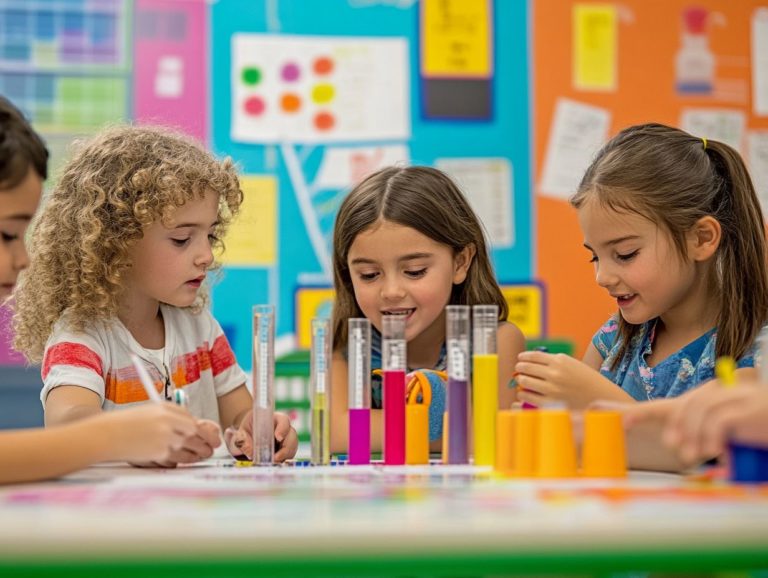What are the Myths of Mindful Parenting?
Contents
- Understanding Mindful Parenting
- Key Takeaways:
- What is Mindful Parenting?
- What are the Benefits of Mindful Parenting?
- 1. Improves Parent-Child Relationship
- 2. Reduces Stress and Anxiety
- 3. Enhances Emotional Regulation
- 4. Increases Empathy and Compassion
- What are the Myths of Mindful Parenting?
- 1. It Requires a Lot of Time and Effort
- 2. It is Only for ‘Perfect’ Parents
- 3. It is a Form of Permissive Parenting
- 4. It is Only for Parents with Young Children
- 5. It is a One-Size-Fits-All Approach
- Adaptability in Mindful Parenting
- How Can You Incorporate Mindful Parenting into Your Life?
- Frequently Asked Questions
- What are the Myths of Mindful Parenting?
- Is Mindful Parenting only for hippie or new age parents?
- Do I need to have a lot of free time to practice mindful parenting?
- Is it possible to be a perfect mindful parent?
- Does mindful parenting mean letting go of discipline and structure?
- Can mindful parenting be harmful to my child’s independence and development?
Understanding Mindful Parenting
In today’s fast-paced world, mindful parenting presents a refreshing approach to raising your children with intention and presence. Let s dive into the essence of mindful parenting, emphasizing its myriad benefits, including the strengthening of parent-child relationships and the reduction of stress. Mindfulness also clarifies common parenting misconceptions and myths, providing a more accepting reality for various parenting styles.
You may encounter common myths that could discourage you from embracing this practice, but rest assured, it is accessible to everyone, no matter your parenting style or the age of your children.
Discover practical tips for weaving daily mindfulness and mindful practices into your parenting journey! Nurturing a more compassionate and harmonious family dynamic along the way can significantly improve family wellness.
Key Takeaways:

- Mindful parenting is not just about being present, but also about understanding and regulating emotions to improve the parent-child relationship.
- Contrary to common myths and parenting misconceptions, mindful parenting does not require perfection or a lot of time and effort; it focuses on being present and communicating effectively.
- Mindful parenting is a flexible approach that can be incorporated into any stage of parenthood and benefits both parents and children through improved emotional awareness and positive reinforcement.
What is Mindful Parenting?
Mindful parenting is an approach that invites you to be fully present and engaged with your child, fostering a deeper bond and understanding in your interactions. This practice encourages you to cultivate mindful awareness being aware of your thoughts and feelings in the present moment equipping you to navigate parenting challenges with heightened emotional intelligence, or the ability to understand and manage emotions, and support. Techniques such as mindful movement and focus on breath can be integrated into your routine, enhancing your overall mindfulness programming.
By integrating mindfulness techniques like meditation and breath focus you can enhance your self-awareness and develop coping strategies that contribute to a serene family atmosphere. Ultimately, mindful parenting nurtures emotional regulation and strengthens family dynamics, creating a more harmonious environment for your child’s development. Engaging in mindfulness activities can also support cognitive development and mental health promotion.
What are the Benefits of Mindful Parenting?
The benefits of mindful parenting are truly transformative, influencing both you and your child in ways that deeply enhance family dynamics and emotional well-being. By embracing mindful parenting, you can develop emotional regulation skills that lead to healthier interactions with your child.
This approach encourages a serene family environment, giving you the power to navigate parenting challenges with poise and resilience. Mindfulness enhances your emotional awareness and fosters positive reinforcement in your child’s mental health, making it an essential tool for nurturing meaningful relationships and promoting children’s mental health.
1. Improves Parent-Child Relationship
Mindful parenting is essential for enhancing the parent-child relationship, creating deeper connections through elevated emotional intelligence and intentional practices. By immersing yourself in present moment awareness, you can respond to your child’s needs with genuine empathy and understanding, enriching your interactions in meaningful ways. This approach fosters nurturing relationships that instill a sense of security and emotional support both vital for healthy childhood development.
Techniques like active listening enable you to fully grasp your child’s feelings and thoughts, resulting in more impactful exchanges. For instance, when faced with a moment of frustration, practicing mindful breathing and taking deep breaths allows you to maintain your composure, ensuring your child feels acknowledged rather than overlooked.
Engaging in mindfulness activities, such as guided family meditation or simple breathing exercises, can help cultivate emotional awareness and self-awareness together, reinforcing the habit of checking in with each other’s feelings.
These practices not only enhance communication but also build trust, empowering your child to express themselves freely and develop resilience in the process.
2. Reduces Stress and Anxiety
Imagine a home where stress melts away. One of the remarkable benefits of mindful parenting is its capacity to significantly reduce stress and anxiety for both you and your children, creating a more harmonious home environment. By weaving mindfulness practices such as deep breathing exercises and meditation into your daily routines, you can nurture a stress-free approach to parenting that enhances emotional regulation. This not only eases your personal stress but also serves as a powerful model for healthy ways to handle emotions, giving your children the power to navigate their own emotions with confidence.
Incorporating mindful movement think yoga or simple stretching exercises can establish a shared family practice that promotes both physical health and relaxation. These activities contribute to a calmer family life and better overall wellness. Engaging in these activities together cultivates a deeper sense of connection as your family learns to tune into your bodies and fully embrace the present moment.
Mindful eating is another effective strategy. Discover the joy of mindful eating by encouraging you and your children to savor each meal and appreciate every bite. This practice can enhance digestion and foster a healthier relationship with food, contributing to better overall mental health.
These strategies play a vital role in enhancing family wellness by instilling a culture of mindfulness that not only addresses stress and anxiety but also nurtures empathy, patience, and understanding within your family dynamic.
3. Enhances Emotional Regulation
Mindful parenting enhances your ability to regulate emotions, providing both you and your children with essential tools to manage feelings effectively. This leads to healthier interactions and significantly fewer conflicts. Start practicing mindfulness techniques today to transform your parenting approach. By modeling emotional awareness and self-regulation skills, you help your children develop these critical abilities themselves, which are crucial for cognitive development.
Programs that focus on mindfulness in schools have demonstrated that children exposed to emotional regulation practices often exhibit improved behavior and heightened emotional intelligence, making mindful parenting a vital aspect of effective parenting styles.
Incorporating mindfulness into your daily routines whether during mealtimes or bedtime offers a unique opportunity for you and your children to connect on a deeper level. Research shows that families who engage in mindfulness activities, like breathing exercises or guided meditations, frequently report reduced stress and increased empathy among family members, improving overall family dynamics.
One compelling case study involving families participating in a mindfulness training program revealed significant positive changes, particularly in communication skills, emotional responses, and mental health promotion. These practices not only cultivate a serene home atmosphere but also empower your children to express their feelings constructively, enabling them to cope with life’s challenges more adeptly and contribute to their childhood development.
4. Increases Empathy and Compassion

Embracing mindful parenting can enhance empathy and compassion in your family. It creates a nurturing environment that supports your children’s emotional development.
By practicing mindfulness, you gain a deeper understanding of your children’s perspectives. This boosts their emotional intelligence and allows for more compassionate responses, which are essential for healthy relationships.
This approach strengthens family dynamics and equips your children with the emotional skills they need to foster healthy relationships throughout their lives.
When you engage in mindfulness, you become more attuned to your own emotions and reactions. This enables you to respond thoughtfully instead of reacting without thinking during challenging moments.
For example, when your child struggles with homework, a mindful approach would be to pause and ask open-ended questions. This uncovers their feelings about the situation, rather than rushing to offer solutions or expressing frustration. This method improves parent-child interaction.
Incorporating techniques like mindful breathing during tense moments or dedicating time each day for reflection can transform your daily interactions. These practices create a supportive atmosphere and model for your children the significance of empathy and effective communication in their own relationships.
What are the Myths of Mindful Parenting?
Despite its growing popularity, mindful parenting is frequently clouded by myths and misconceptions. These may deter you from embracing this transformative approach.
You might think that mindful parenting demands an overwhelming amount of time and effort or that it s only for ‘perfect’ parents. Such misunderstandings can make it seem less accessible.
In reality, you can easily weave mindful parenting into your daily routines. This fosters a more stress-free parenting experience while enhancing emotional awareness and strengthening family bonds.
Engaging in parenting workshops or joining the Stress-Less Parenting Club can provide further guidance.
1. It Requires a Lot of Time and Effort
One of the common misconceptions about mindful parenting is that it demands a significant amount of time and effort. This can be discouraging for busy parents like you.
In truth, you can seamlessly integrate mindful practices into your daily life. This allows you to cultivate mindfulness without overhauling your routines.
Simple techniques, such as incorporating daily mindfulness exercises and creating moments of mindful awareness during interactions, can profoundly enhance your family dynamics.
These techniques are often taught by family psychologists and mindfulness experts like Thich Nhat Hanh and Carla Naumburg.
For instance, taking just a few minutes for deep breathing during your morning routine sets a calm tone for the entire day. A brief check-in with your children about their feelings during car rides fosters a deeper emotional connection.
Sharing a ‘gratitude moment’ at dinner encourages reflection and appreciation, reinforcing positive interactions in your family. Even spending time in nature, like enjoying a mindful walk in the park, provides invaluable opportunities for connection and promotes children’s mental health.
These activities can be effortlessly woven into your existing schedule. Mindful parenting is more about savoring quality moments than making long-term commitments.
2. It is Only for ‘Perfect’ Parents
Another common misconception is that mindful parenting is something only ‘perfect’ parents can achieve. This belief leaves many of you feeling unqualified to embrace mindfulness. The true essence of mindful parenting lies in self-awareness and continuous growth something that s attainable for every parent, regardless of their perceived parenting style.
When you embrace mindfulness as a tool for personal and family development, you open the door to emotional regulation. This will transform family dynamics and create a calm, loving home!
By cultivating a mindful approach, you can create a nurturing environment that fosters open communication and emotional resilience. For example, taking a moment to breathe before responding to your child’s tantrum can turn a stressful situation into a valuable teaching moment.
Accepting that imperfections and accepting reality are natural parts of the parenting journey not only eases the pressure on you but also instills essential lessons about empathy and growth in your children.
When you acknowledge your own missteps with honesty and grace, you model resilience and vulnerability. This shows your kids that it s perfectly okay to be imperfect on this parenting path. It can be a powerful lesson in emotional awareness and self-regulation skills.
3. It is a Form of Permissive Parenting
Many may mistakenly equate mindful parenting with permissive parenting, assuming it fosters a lack of structure or discipline. However, mindful parenting is about creating emotional intelligence and using positive reinforcement, which allows you to maintain boundaries while nurturing your children.
This approach gives you the power to engage with your children thoughtfully yet assertively, blending discipline with compassion.
Practicing mindful parenting means finding that sweet spot between guidance and understanding. This ensures that your children feel heard and valued while absorbing important life lessons. Unlike permissive parenting, which can lead to a lack of accountability, mindful parenting equips your children with the tools to comprehend their actions and the consequences that follow. This method supports cognitive development and emotional intelligence.
By actively listening and validating their feelings, you can address behavioral issues in a manner that respects their emotional state while still setting clear expectations.
Ultimately, this method strengthens the bond between you and your children, fostering an atmosphere where discipline is seen as a supportive resource rather than a punitive measure. This approach is often discussed in parenting workshops and parenting advice sessions.
4. It is Only for Parents with Young Children
The notion that mindful parenting is solely for those with young children is a widespread misconception that undermines its true potential. In reality, mindful parenting is relevant across all stages of childhood development, offering invaluable tools for nurturing emotional awareness and effective coping strategies as children mature.
By weaving mindfulness practices into your family life, regardless of your children’s ages, you can enhance overall family wellness and strengthen emotional bonds throughout their lives. This can include practices like mindful movement or mindful eating.
For instance, with toddlers, simple practices like taking mindful breaths together can work wonders in soothing them during tantrums, fostering their self-regulation. As children transition into their school years, mindfulness can evolve to encourage techniques such as sharing feelings and observing thoughts without judgment, which helps build resilience. Schools can also be a place where mindfulness in schools initiatives support mental health promotion.
When the teenage years roll around, filled with challenges of identity and independence, you can model mindfulness through active listening and empathetic responses. This creates a supportive environment that promotes open communication and aids in cognitive development.
This adaptability across developmental stages not only fosters a harmonious family dynamic but also equips your children with lifelong skills to navigate their emotions and relationships with confidence.
Start practicing mindfulness today to foster a loving and resilient family environment!
5. It is a One-Size-Fits-All Approach

Another common misconception is that mindful parenting is a one-size-fits-all approach, which can lead to unrealistic expectations and frustrations. In truth, mindful parenting is a customizable practice that encourages you to adapt mindfulness techniques to your unique family dynamics and individual parenting challenges. This can be addressed in mindfulness programming and parenting tips tailored to your needs.
By focusing on awareness skills, you can apply mindful practices with the flexibility that reflects your family s values and needs.
Adaptability in Mindful Parenting
Recognizing that each family has its own history, culture, and context allows you to explore various mindfulness strategies that resonate with your personal beliefs and day-to-day realities. This might involve practices like mindful communication during conflicts, intentionally setting aside moments for reflection, or incorporating calming rituals that align with your children s temperament. These are often discussed in parenting workshops and mindfulness activities.
The essence of mindful parenting lies in its capacity to evolve alongside your family s circumstances, fostering a nurturing atmosphere where you feel empowered to experiment and discover what best supports both your emotional well-being and your children’s growth. This adaptability is a key theme in mindfulness myths and how they are debunked.
How Can You Incorporate Mindful Parenting into Your Life?
Start embracing mindful parenting today to transform your life and your family’s dynamics! Incorporating mindful parenting into your life means embracing mindfulness techniques and practices that effortlessly integrate into your daily routine, ultimately enhancing your well-being.
Begin with straightforward daily mindfulness exercises maybe focusing on your breath or taking deep breaths during those stressful moments. By doing this, you cultivate a more present and engaged mindset. These mindfulness techniques can transform your approach to parent-child interaction.
This shift not only benefits you as a parent but also enriches your interactions with your child, fostering emotional awareness and nurturing deeper relationships.
1. Practice Mindfulness Yourself
Practicing mindfulness is the essential first step in weaving mindful parenting into your life. It gives you the power to model emotional awareness and self-regulation for your children. By engaging in meditation practices and mindfulness exercises, you develop a stronger awareness of the present moment, allowing you to face parenting challenges with calmness and clarity. This personal journey enriches not only your own experience but also enhances the parent-child relationship through your heightened emotional intelligence.
To embark on this mindfulness journey, carve out a few minutes each day for quiet reflection or guided meditation. You can utilize apps or online resources to provide structure and inspiration for your practice. Many parents find Carla Naumburg s writings and the Stress-Less Parenting Club to be helpful resources.
Mindfulness can easily fit into your daily routine consider taking a few deep breaths before responding to your child’s questions or practicing gratitude during family meals. Embracing these techniques not only nurtures your own well-being but also demonstrates to your children the transformative power of being present, ultimately fostering their emotional resilience and awareness as well. These techniques are part of a broader approach to stress-less parenting.
Take the first step toward mindful parenting now, and experience the transformational benefits for your family!
2. Set Realistic Expectations
Setting realistic expectations is essential for your journey into mindful parenting. It enables you to navigate its complexities without the weight of perfectionism. Recognizing that mindful parenting is an evolving practice allows for better emotional management and significantly reduces stress.
By acknowledging the challenges you face, you can celebrate every small victory. This fosters a more compassionate environment for yourself and your children, promoting family wellness.
This journey demands an adaptable mindset. It’s crucial to understand that no single parenting approach fits all. Emphasizing progress over perfection helps you appreciate the value in even minor improvements.
Learning from difficult moments cultivates resilience. Flexibility is vital; some days may not go as planned, and that s entirely normal. Understanding this helps you clear up common parenting myths.
Embracing setbacks as growth opportunities enhances your parenting experience. By consciously tuning into your emotions and your child’s needs, you can forge deeper connections. This creates a nurturing atmosphere where both you and your children can truly thrive. This approach is supported by family psychologists and advocates of child development.
3. Communicate Effectively with Your Child
Effective communication stands as a cornerstone of mindful parenting. It provides the foundation for open dialogue and strengthens family relationships. By embracing mindful practices during conversations like active listening and prioritizing emotional support you create a safe space for your children to express themselves.
This thoughtful approach fosters deeper connections and enhances emotional awareness for both you and your child. Practicing mindful habits encourages healthy parenting styles.
When you actively listen, you validate your child s feelings, making them feel valued and understood. Instead of simply offering solutions, reflect on what your child has shared.
Ask open-ended questions that encourage them to explore their emotions further. Techniques like acknowledging your child s frustrations or joys without judgment can significantly enhance their emotional intelligence.
Over time, these meaningful interactions will cultivate a robust emotional foundation. This gives your children the power to express themselves openly and nurture their own emotional growth as they navigate life’s challenges.
4. Be Present in the Moment
Being present in the moment is crucial for mindful parenting. It allows you to fully engage with your child and appreciate the beauty of your shared experiences. By practicing mindfulness techniques, such as focusing on the here and now, you enhance your emotional awareness and strengthen your relationships.
This dedication to quality time fosters a nurturing environment where your child feels valued and understood.
In today s whirlwind of distractions, it’s easy to get caught up in technology and daily responsibilities. This leads to missed opportunities for genuine connection.
By prioritizing undistracted moments like setting aside tech-free times during meals or play you can significantly influence emotional growth. Active listening, where you thoughtfully respond to your child s words, nurtures trust and fosters open communication.
Incorporating simple activities, such as shared storytelling or nature walks, can deepen your connections. It allows you to witness and celebrate your child’s curiosity and creativity.
Ultimately, being present enhances your relationship with your child and positively impacts your family dynamics. It cultivates an atmosphere of love and support.
Start today by setting aside 15 minutes of tech-free time with your child!
5. Show Empathy and Understanding

Demonstrating empathy and understanding is an essential component of mindful parenting, greatly enhancing emotional intelligence and nurturing meaningful relationships. By actively practicing empathy, you can connect with your child’s feelings, enabling them to navigate their emotions with greater ease. This approach not only reinforces positive behaviors but also creates an environment where your child feels safe and encouraged to express themselves.
When you model empathy, you equip your child with vital emotional skills, laying a strong foundation for their ability to relate to others. To cultivate this practice, consider implementing strategies like active listening, where you give your full attention to your child’s concerns and validate their feelings without judgment.
Engaging in regular family discussions about emotions gives the power to your children to articulate their own experiences effectively. Additionally, taking moments for shared mindfulness activities, such as deep breathing or guided imagery, allows both you and your child to collectively regulate your emotions. The benefits of these empathetic interactions are truly profound, leading to increased emotional resilience and stronger family bonds.
Frequently Asked Questions
What are the Myths of Mindful Parenting?
The Myths of Mindful Parenting are common misconceptions about the practice of being a mindful parent. They include beliefs that mindful parenting is only for certain types of parents or that it requires a lot of time and effort.
Is Mindful Parenting only for hippie or new age parents?
No, mindful parenting is for all parents, regardless of their beliefs or lifestyle. It is simply a way of being present and attentive in your parenting, which can benefit both you and your child.
Do I need to have a lot of free time to practice mindful parenting?
No, you can incorporate mindful parenting into your daily routine and interactions with your child. It doesn’t require any extra time, just a shift in mindset and approach.
Is it possible to be a perfect mindful parent?
No, perfection is not the goal of mindful parenting. It’s about being aware and present in the moment and accepting both your own imperfections and those of your child.
Does mindful parenting mean letting go of discipline and structure?
No, mindful parenting actually emphasizes the importance of setting boundaries and being consistent with discipline. It’s about finding a balance between being mindful and being an effective parent.
Can mindful parenting be harmful to my child’s independence and development?
No, mindful parenting actually encourages independence and self-awareness in children. It teaches them to be present and make conscious choices, rather than simply reacting to their surroundings.






